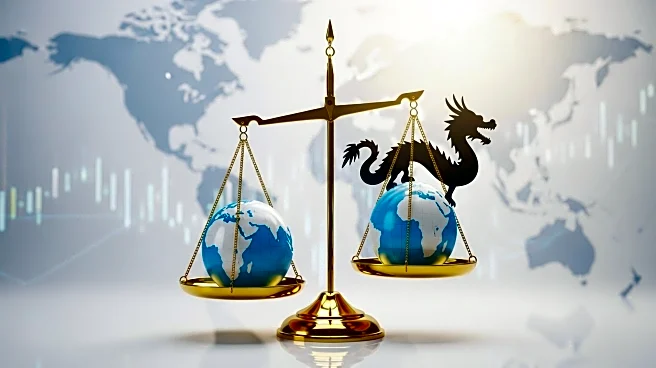What's Happening?
A report from Boston University's Global Development Policy Centre reveals that developing nations are now repaying more to China than they receive in new financing. The report, titled 'Reviving Chinese Development Finance in the Global South,' indicates that net debt transfers from China to these countries turned negative in 2022 and 2023, with nations collectively repaying $3.9 billion more each year than they borrowed. Historically, China has been a significant financier of infrastructure in the Global South, channeling over $472 billion through its policy banks, the China Development Bank and the Export-Import Bank of China, between 2008 and 2024. These funds have supported over 900 projects worth $316 billion in various sectors, contributing to economic growth and poverty reduction. The report warns that without a rebound in Chinese overseas lending, growth and climate investment in developing nations could stall.
Why It's Important?
The shift in debt payments from developing nations to China has significant implications for global economic dynamics and development finance. As the world's largest bilateral lender, China's financial strategies impact infrastructure development and economic growth in the Global South. The negative net debt transfer could hinder progress in these regions, affecting public assets and poverty alleviation efforts. Additionally, the report's findings highlight the need for innovative financial solutions, such as refinancing distressed loans and expanding green lending, to sustain development finance. The proposed zero-tariff initiative by China aims to boost imports from Africa, offering a lifeline to Chinese state-owned firms facing declining domestic demand. This strategic move could strengthen economic ties between China and African countries, influencing global trade patterns.
What's Next?
China's financial strategies are likely to evolve as it seeks to balance its domestic economic challenges with its role as a major lender to developing nations. The report outlines measures to reinvigorate development finance, including issuing RMB-denominated bonds and encouraging cooperative foreign investment. These initiatives could foster deeper financial alignment between China and its partners, as seen in Kenya's recent conversion of major Chinese railway loans from U.S. dollars to yuan. Additionally, China's zero-tariff treatment for African countries may enhance trade relations and support economic growth in the region. Stakeholders in the Global South will need to navigate these changes to optimize their development strategies and financial partnerships.
Beyond the Headlines
The evolving financial relationship between China and developing nations raises ethical and strategic questions about debt sustainability and economic dependency. As China adjusts its lending practices, countries in the Global South must consider the long-term implications of their financial ties with China. The shift towards yuan-denominated transactions and green lending could redefine economic alliances and influence global trade dynamics. Moreover, the focus on climate investment underscores the importance of sustainable development practices in addressing environmental challenges. These developments may prompt broader discussions on the role of major economies in supporting global development and the ethical considerations of international lending.











